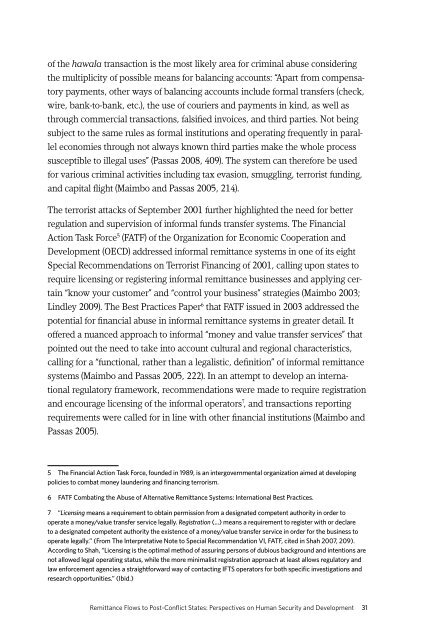Pardee-CFLP-Remittances-TF-Report
Pardee-CFLP-Remittances-TF-Report
Pardee-CFLP-Remittances-TF-Report
You also want an ePaper? Increase the reach of your titles
YUMPU automatically turns print PDFs into web optimized ePapers that Google loves.
of the hawala transaction is the most likely area for criminal abuse consideringthe multiplicity of possible means for balancing accounts: “Apart from compensatorypayments, other ways of balancing accounts include formal transfers (check,wire, bank-to-bank, etc.), the use of couriers and payments in kind, as well asthrough commercial transactions, falsified invoices, and third parties. Not beingsubject to the same rules as formal institutions and operating frequently in paralleleconomies through not always known third parties make the whole processsusceptible to illegal uses” (Passas 2008, 409). The system can therefore be usedfor various criminal activities including tax evasion, smuggling, terrorist funding,and capital flight (Maimbo and Passas 2005, 214).The terrorist attacks of September 2001 further highlighted the need for betterregulation and supervision of informal funds transfer systems. The FinancialAction Task Force 5 (FA<strong>TF</strong>) of the Organization for Economic Cooperation andDevelopment (OECD) addressed informal remittance systems in one of its eightSpecial Recommendations on Terrorist Financing of 2001, calling upon states torequire licensing or registering informal remittance businesses and applying certain“know your customer” and “control your business” strategies (Maimbo 2003;Lindley 2009). The Best Practices Paper 6 that FA<strong>TF</strong> issued in 2003 addressed thepotential for financial abuse in informal remittance systems in greater detail. Itoffered a nuanced approach to informal “money and value transfer services” thatpointed out the need to take into account cultural and regional characteristics,calling for a “functional, rather than a legalistic, definition” of informal remittancesystems (Maimbo and Passas 2005, 222). In an attempt to develop an internationalregulatory framework, recommendations were made to require registrationand encourage licensing of the informal operators 7 , and transactions reportingrequirements were called for in line with other financial institutions (Maimbo andPassas 2005).5 The Financial Action Task Force, founded in 1989, is an intergovernmental organization aimed at developingpolicies to combat money laundering and financing terrorism.6 FA<strong>TF</strong> Combating the Abuse of Alternative Remittance Systems: International Best Practices.7 “Licensing means a requirement to obtain permission from a designated competent authority in order tooperate a money/value transfer service legally. Registration (...) means a requirement to register with or declareto a designated competent authority the existence of a money/value transfer service in order for the business tooperate legally.” (From The Interpretative Note to Special Recommendation VI, FA<strong>TF</strong>, cited in Shah 2007, 209).According to Shah, “Licensing is the optimal method of assuring persons of dubious background and intentions arenot allowed legal operating status, while the more minimalist registration approach at least allows regulatory andlaw enforcement agencies a straightforward way of contacting IFTS operators for both specific investigations andresearch opportunities.” (Ibid.)Remittance Flows to Post-Conflict States: Perspectives on Human Security and Development 31


